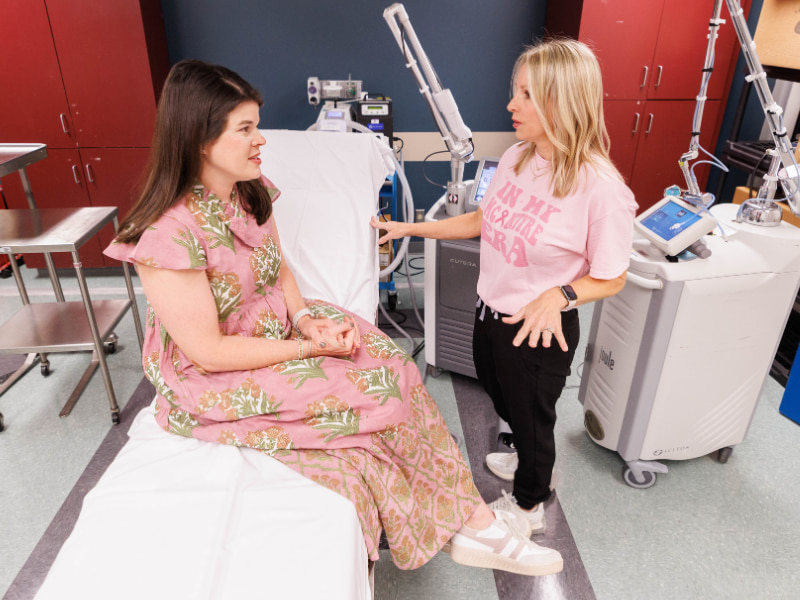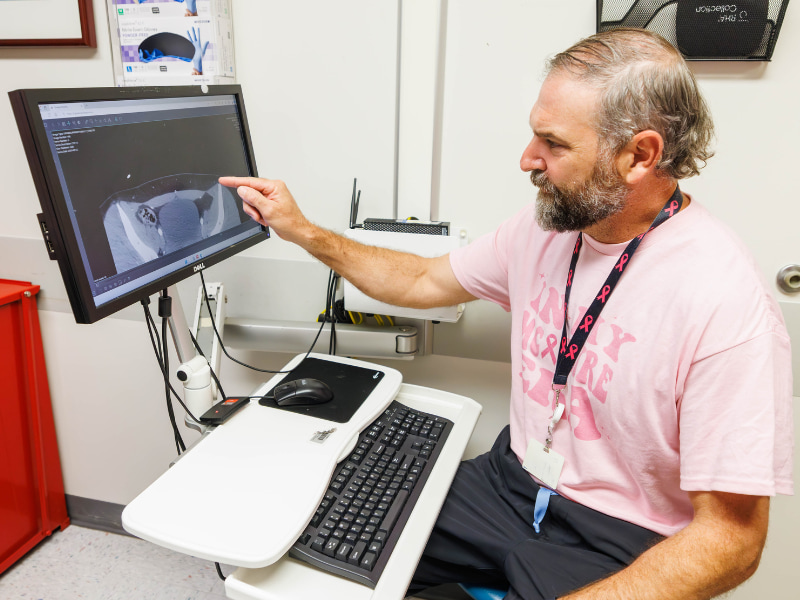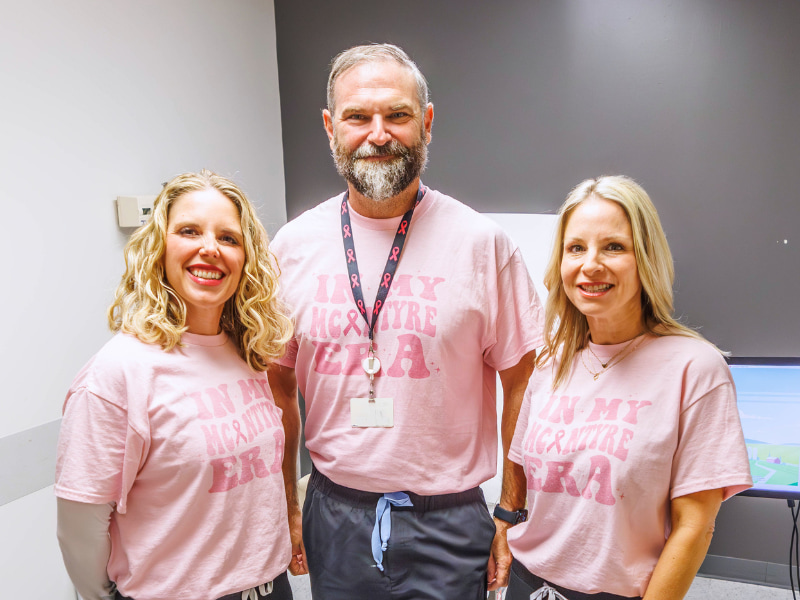UMMC surgeon delivers life-changing care for breast cancer survivors with advanced reconstruction

Receiving a breast cancer diagnosis is devastating, but starting the much-anticipated reconstruction journey only to face severe complications is truly unimaginable.
Such was the case for mother of three Audra Shepherd when, at 34, she received the life-altering diagnosis of infiltrating ductal carcinoma. Determined to fight, she underwent a lumpectomy followed by months of chemotherapy, hoping to rid her body of the cancer. However, genetic testing later revealed she carried a BRCA gene mutation, which significantly raised her risk of the cancer returning. Faced with this daunting reality, Shepherd made the decision to undergo double mastectomies in an effort to lower her chances of recurrence. But after what was meant to be a preventative measure, she found herself facing an unexpected complication requiring emergency specialized surgery.

“The complications had gotten so bad from the mastectomy that the surgeon basically said I had a week to find someone who could do this surgery before it was too late,” Shepherd said.
Now in a race against the clock, she and her husband started calling clinics and hospitals near their home in Germantown, Tennessee. “We were calling all over,” Shepherd said. “There weren’t surgeons in our area who were trained for this. It was a very stressful time with so many unknowns.”
Desperate for a solution, her husband, Brandon, turned to his alma mater, UMMC, where he had completed his residency in the Department of Otolaryngology – Head and Neck Surgery in 2021. Through this connection, they found Dr. Benjamin McIntyre and his multi-disciplinary team of specialists, experts in handling complex cases like Shepherd’s.
McIntyre, a professor of plastic surgery and specialist in breast cancer reconstruction, is highly trained and experienced in performing deep inferior epigastric perforator, or DIEP, flap procedures. This breast reconstruction technique uses fat, skin and blood vessels from a woman's abdomen or other parts of the body to rebuild the breast. A key aspect of the procedure involves using microsurgical techniques to carefully detach and reattach blood vessels, often just a few millimeters in diameter, ensuring proper blood flow and successful tissue integration.
“Sometimes after a mastectomy, you can have wound healing complications where breast skin can’t heal well,” McIntyre said. “In Ms. Shepherd’s case, it was pretty severe. I’ve only seen that a handful of times and it’s always very stressful for the patient. Most centers and hospitals in the area are not able to do this surgery. So, we were just thankful that we were able to see her and help her through this.”
After speaking to McIntyre on the phone, Shepherd said she immediately felt relieved. “I knew, in that moment, that he could handle this, and he was going to take care of everything,” she said.
McIntyre, who has been with the Medical Center for nine years, pointed out that surgeons trained in performing DIEP flap procedures are rare in many states. “Before coming here, I performed these surgeries for about five and a half years as the primary provider of DIEP flap surgeries in central South Carolina,” he said. “I was building my practice and gaining experience, but I saw a much greater need in Mississippi. That’s one of the main reasons I decided to come here. I feel like I’m able to help more people and have a much wider bandwidth in my practice.”
With one in eight women developing breast cancer in their lifetime, McIntyre specialized in breast reconstruction to help women reclaim their lives after the challenges of diagnosis, surgery and treatment. He and his team prioritize making sure patients feel well-informed from start to finish.
“After a patient receives a diagnosis and discusses their condition with the oncologist, we often provide the final piece of the puzzle, helping women make the most informed decision possible about which operation is right for them,” McIntyre said.
Understanding that patients may be overwhelmed with the emotional weight of their recent diagnosis, he notes that they encourage patients to take their time with their decision.
“When they come to us in that first consultation, there are usually lots of tears,” McIntyre said. “It sometimes takes one or two visits to let everything kind of settle in. So, we just talk and let them ask questions they may not have been able to before. We let them know all their options and assure them that we are here to help them navigate their recovery.”

McIntyre and his team devote significant time to ensuring patients understand their options and make decisions that align with their individual needs. Each patient’s situation is unique, he said, so it’s important to have thorough discussions about their priorities, goals, expectations and comfort levels to identify which approach is best for them.
“Sometimes, patients come to us with their mind made up,” said Michelle Henderson, nurse practitioner. “We still walk them through what that would look like, make sure they are up to date on what all their options truly are. Then we’ll either be certain that day or give them a little bit of time to think it over and call us back. Once they decide, we start mapping out a plan with them. But we always see them back again before surgery, just to make sure all their questions have been answered.”
Shepherd expressed her gratitude for the breast reconstruction team at UMMC including Henderson and RN care coordinator, Sarah Gilbert, who both work with McIntyre. “Before we got to UMMC for the first visit, Sarah called to make sure we started the drive okay and gave us detailed directions for getting there. They’ve become like family,” she said. “They are always checking in on me. They’re so positive and uplifting. I feel so seen with them. They’re always there for me whenever I have questions. They listen and are very relatable and willing to go through all of my options for any concerns I bring up.”
While he and his team regularly do implant-based surgeries, the DIEP flap-based reconstruction is a popular option among McIntyre’s patients. A more technical surgery, the procedure can last anywhere from six to eight hours and has a longer recovery time. However, unlike implant-based reconstruction, DIEP flap doesn’t require multiple additional surgeries or check-ups and significantly reduces the risk of complications. After the initial procedure, Henderson said they wait about six months for everything to settle and then patients come back in for an outpatient revision. Following that, patients are also given the option of nipple reconstruction and tattooing.
In the final step in the reconstruction process, Henderson offers 3D nipple tattooing using multiple pigments to create the appearance of an areola. Having this option is great for patients whose breast skin may be too thin for nipple reconstruction surgery or who want to add color back to the area post-surgery.
That’s probably my favorite part of the whole thing,” she said, “The very end. Once Dr. McIntyre does the nipple reconstruction and I tattoo color behind it, it looks so authentic. It’s the icing on the cake. They stand up, go look in the mirror and it’s just very satisfying to see them be restored. They cry. I cry. There aren’t words for how amazing that is.”
“This experience has taught me that I can do hard things,” said Shepherd. “To anyone who is fighting this battle, ultimately the Lord will care for you. It’s not the easiest journey, but this is a great staff who will take care of you not only with great tools, but compassionately and knowledgeably.”


